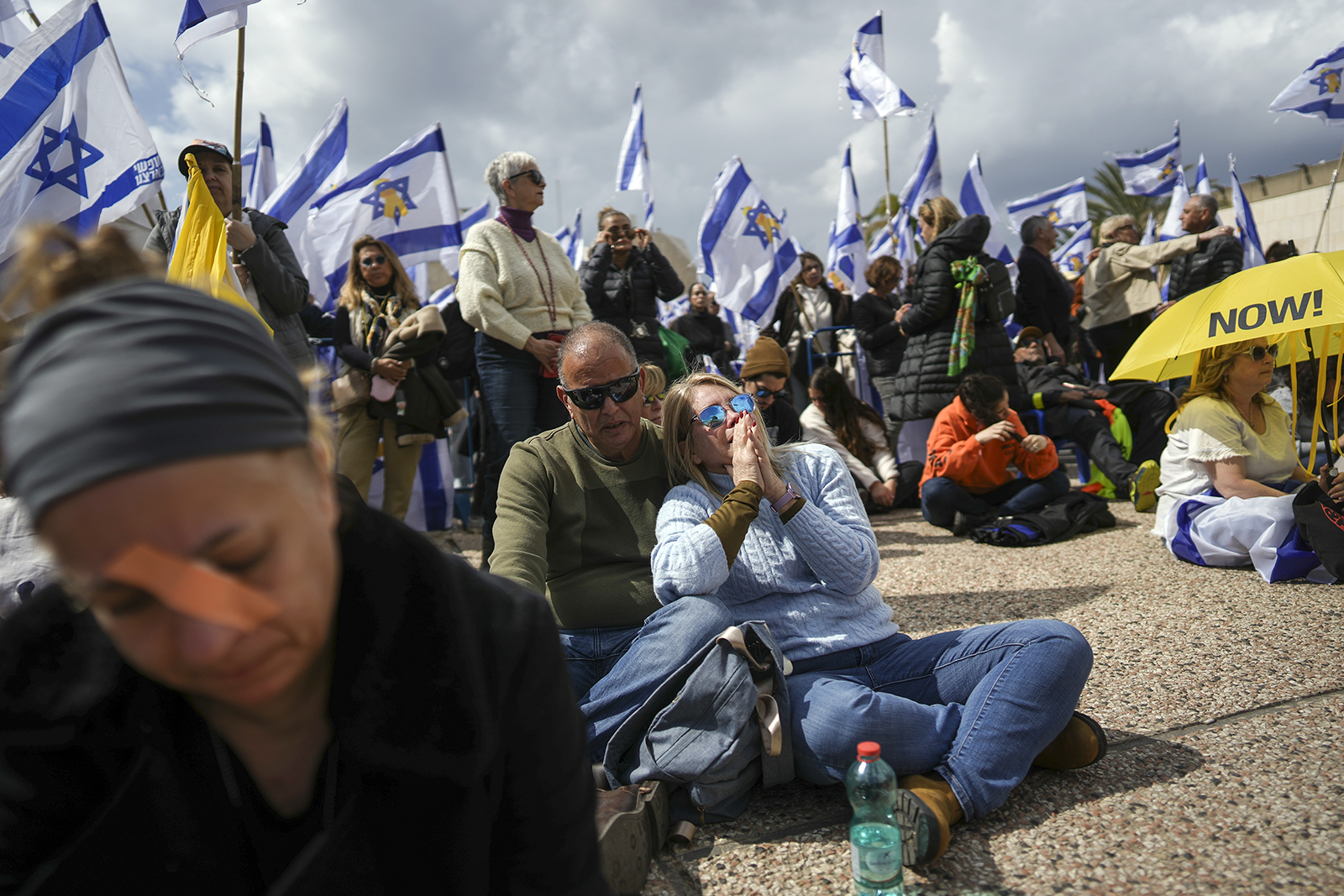
JERUSALEM (RNS) — Once again, Jews in Israel are turning to the rituals and traditions of their faith as they confront an image they hoped to never see: caskets bearing what were believed to be the remains of Shiri Bibas and her young sons, Kfir and Ariel.
Israeli officials were told that the bodies Hamas transferred to Israel on Thursday (Feb. 20) as part of a ceasefire agreement included those of the three Bibas family members. Also returned were the remains of Oded Lifshitz, an 83-year-old peace activist.
On Friday, Feb. 21, the Israeli military said it positively identified the remains of two young hostages but the other body released by Hamas was not the boys’ mother, The Associated Press reported. It said the remains did not match any other hostage either.
Their presumed deaths have shaken the nation but have also unified Jews of different backgrounds.
“Moments like this, of both great tragedy and celebration, remind Jewish people of their shared heritage and their shared destiny,” said Rabbi Seth Farber, founder and director of ITIM: The Jewish Life Information Center, an inclusion-oriented Israeli Jewish advocacy organization. “Despite the differences between Jewish communities around the world, the national moments such as these bind the Jewish community together in an almost inexplicable way.”
Jewish history “is filled with moments that enable the Jewish community around the world to coalesce, and this is one of them,” he said.
Kfir Bibas was 9 months old and Ariel Bibas 4 years old when Hamas stormed Kibbutz Nir Oz in southern Israel on Oct. 7, 2023, and abducted the children and their parents from their home. Video footage from the day shows a terrified Shiri Bibas, in her pajamas and barefoot, holding both children in her arms, surrounded by armed men in civilian clothes.

Pictures of the Bibas family are seen at the entrance of their house at the Kibbutz Nir Oz, southern Israel, Dec. 20, 2023. (AP Photo/Leo Correa)
Hamas has said the children, their mother and Lifshitz were killed along with their guards in Israeli airstrikes during the 15-month-long war but has provided no proof. However, Israeli Prime Minister Benjamin Netanyahu’s office said Lifshitz was killed in captivity by the Islamic Jihad group, The Associated Press reported.
Yarden Bibas, the children’s father, was held separately and released as part of the ceasefire agreement on Feb. 1.
Since their abduction, the redheaded Bibas boys have been a symbol of Israeli hope and anguish. Despite Hamas’ claims that Shiri, Kfir and Ariel Bibas had been killed early in the war, people had clung to the hope, however slim, that they were still alive.
In reaction in Israel, Thursday became a spontaneous day of prayer and solidarity. Thousands lined the streets leading to the Abu Kabir Forensic Institute in Tel Aviv, where the four sets of remains were being analyzed.

A border policewoman and a policeman salute as a convoy carrying the coffins of four Israeli hostages, including the presumed remains of a mother and her two children, arrives at the Abu Kabir Forensic Institute in Tel Aviv, Israel, Feb. 20, 2025. The bodies were handed over by Palestinian militant groups in Gaza as part of the ceasefire agreement. (AP Photo/Ohad Zwigenberg)
At the Midreshet Lindenbaum seminary in Jerusalem, dozens of young women from Israel, the United States and South America prayed and studied in memory of the hostages killed. Many Israelis donated to charity in honor of the Bibas family and the other hostages.
Rabbi Yuval Cherlow, head of the Tzohar Center for Jewish Ethics in Israel, said freeing hostages is a top priority in Judaism.
“Even so, we should distinguish between the living and the dead,” he said. “The priority is to bring back living people. It’s not only Jewish law that guides us. It is also humanity and the wishes of the family.”
The requirement to bury the dead is equally important, Cherlow said.
According to Jewish tradition, “a human being is created out of the soul of God, and also from the land,” he said. “We believe that the soul goes back to God and the body must return to the soil and be part of it, from the beginning. It’s an essential issue. We are really very strict with it. We make a great deal of effort to bury every Jewish body back to the ground.”
The Rabbinate, the Israel Defense Forces and other organizations have worked to ensure a Jew’s bodily remains are buried in a Jewish cemetery. Since the start of the war, IDF soldiers have retrieved body parts for proper burial after explosions killed their peers.
Rabbi David Stav, co-founder of the Tzohar Rabbinical Organization, an Israeli Orthodox rabbi group, said the commandment to bury a Jewish adult or child in a Jewish cemetery is an act of respect and dignity. “We also believe in the survival of the soul, and burial allows the soul to rest in peace,” he said.
According to the Talmud, Stav said, during the Bar Kokhba rebellion by the Jews of Judaea against the Roman Empire, the Romans initially forbade Jews from burying their dead. And once the Jews were allowed to bury them, “it was seen as a sign from God. It gave them hope and redemption.”
When Shiri, Kfir and Ariel Bibas are buried, he said, it will be a time of national mourning but also an opportunity to provide comfort to the family and the nation.
“We will know, at least, that the mother and children will have a Jewish burial,” Stav said.
This story has been updated.
